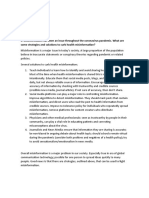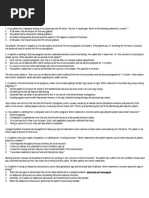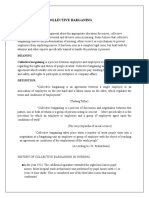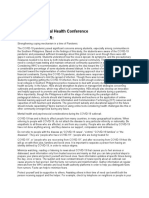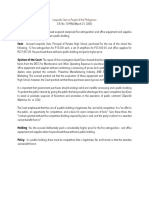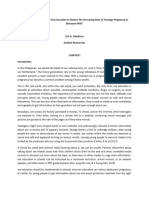Ateneo de Davao University Graduate School: Answer
Uploaded by
DENNIS N. MUÑOZAteneo de Davao University Graduate School: Answer
Uploaded by
DENNIS N. MUÑOZAteneo de Davao University
Graduate School
Name: Dennis N. Muñoz, LPT, RM, RN Course: Nsg 706- Advanced Medical-
Student Number: 22017001253391 Surgical Nursing
Degree: Master’s in Nursing Professor: Dr. Vilma Lu-Comoda
Watch and react: Open FB: Delex ICU Forum on June 17, 2020 on Psychosocial
Impact of Covid-19 Pandemic to Frontliners
Guide Questions:
1. What are the main points that are highlighted by the speaker/author?
Answer:
The novel coronavirus has touched off another stealthy and growing public health
crisis that calls for an equally matched emergency response.
Like other pandemics and emerging disease outbreaks, COVID-19 is creating
immense psychosocial disturbances. The disease involves an unfamiliar threat that
is difficult to detect and challenging to distinguish from more benign illnesses.
Protracted and dynamic pandemic conditions will draw out the anxiety. Things will
get worse before they get better. Absent a vaccine, nonpharmaceutical interventions
are the only way to prevent infections, and they dramatically upset everyday bodily
habits, social interactions and economic exchanges.
Interventions are essential because specific groups are at a higher risk of both acute
and lingering emotional distress. Health care workers on the epidemic front lines
face compounding stressors: the prospect of more and longer shifts, the need to
improvise childcare coverage, finite supplies of personal protective equipment, fear
of bringing infection home, witnessing co-workers becoming ill, and making tough
allocation decisions about scarce, lifesaving resources like mechanical ventilators.
2. How is it related to your life, experiences, feelings, and ideas?
Answer:
Exposed individuals confront a potential cascade of challenging circumstances. To
protect others, they may enter a state of self-quarantine. During the incubation
period, they must live with uncertainty and limit physical contact with others while
trying to maintain social connectedness. Derailed income-generating activities and
unmet obligations to others can further fuel the stress. Infected individuals may
become sick, experience a lengthy convalescence, feel survivor’s guilt, and be
shunned despite a complete recovery. A parity struggle continues for emotional
well-being to secure the same importance, service capacity and financing structures
as physical health. There is a shortage of mental health professionals, and many
Americans forego help because of cost, stigma and not knowing how to plug in.
Such flaws require long-term systemic change. Nevertheless, decision makers,
providers and communities can still act now to help alleviate pandemic-induced
emotional distress.
3. How did it change your perspective or your understanding on this particular
topic?
Answer:
For people with preexisting mental health conditions, a pandemic can further
heighten their anxious thoughts and compulsive behaviors. Previously managed
symptoms can flare up, requiring additional care beyond what was sufficient pre-
crisis. Disrupted support systems and social isolation can leave people with mental
health conditions especially vulnerable to acute stress reactions in an epidemic.
Foreground mental health in the response: Allocation decisions for current and
future COVID-19 relief funds should include mental health. State and local public
health officials should invite their behavioral health authorities to plan the pandemic
response together; they can jointly design risk and crisis communication, social
distancing protocols and large-scale operations such as drive-through diagnostic
testing in ways that promote calm, build resilience and instill hope. Businesses
should remind workers of employee assistance programs that then incorporate
COVID-19 resources, including virtual ones. Health systems should provide
employees the time, place and support staff to help them cope. Neighbors should
off-load health care workers’ concerns about childcare and family meals.
Read and react: Mental Health and Coping During Covid https://www.cdc.gov )
Coping with Stress (subtopics- Pandemics can be stressful; Take care of your
mental health; Everyone reacts differently to stressful situations; Take care of
yourself and your community; Healthy ways to cope with stress; Know the facts
to help reduce stress; Take care of your mental health and; Recovering from
Covid-19 or ending home isolation."
Guide Questions:
1. What are the main points that are highlighted by the author?
Besides COVID-19, the 21st century is also the era of emerging pandemic of mental
illnesses Thus, psychological, and social preparedness of this pandemic carries global
importance. The government and stakeholders must appreciate the psychosocial
morbidities of this pandemic and assess the burden, fatalities and associated
consequences. Stigma and blame targeted at communities affected by the outbreak
may hinder international trade, finance and relationships, instigating further unrest. Due
care needs to be taken to erase the stigma associated with disease, racism, religious
propaganda and psychosocial impact and needs to be implemented by regular
discussion with trained and specialist health care personnel by making task force and
execution teams who are directly engaged in health care delivery systems without
creating any communication gaps between policy makers and ground level workers.
Setting up mental health organizations specific for future pandemics with branches in
many nations and in individual healthcare institutions for research, mental healthcare
delivery and arranging awareness program at both personal and community levels is
desperately needed. Structured websites and toll free helpline numbers may be
launched for alleviating psychological distress among the general public regarding this
ongoing pandemic. Social media is to be used in good sense, to educate people on
transmission dynamics, symptoms of disease, and time when exact medical
consultations are needed. To protect social media from devaluations, strict government
laws and legislation regarding fake news, social media rumors, disinformation and
misinformation are to be implemented. The COVID-19 pandemic has clearly shown us
how a “virus” can negatively impact our lives even in the 21st century and
simultaneously made us realize that the greatest assets of mankind are health, peace,
love, solidarity, ingenuity, and knowledge.
2. How is it related to your life, experiences, feelings, and ideas?
Know what to do if you are sick and are concerned about COVID-19. Contact a
health professional before you start any self-treatment for COVID-19.
Know where and how to get treatment and other support services and resources,
including counseling or therapy (in person or through telehealth services).
Take care of your emotional health. Taking care of your emotional health will help
you think clearly and react to the urgent needs to protect yourself and your
family.
Take breaks from watching, reading, or listening to news stories, including those
on social media. Hearing about the pandemic repeatedly can be upsetting.
Take care of your body.
o Take deep breaths, stretch, or meditate external icon.
o Try to eat healthy, well-balanced meals.
o Exercise regularly.
o Get plenty of sleep.
o Avoid excessive alcohol and drug use.
Make time to unwind. Try to do some other activities you enjoy.
Connect with others. Talk with people you trust about your concerns and how
you are feeling.
Connect with your community- or faith-based organizations. While social
distancing measures are in place, consider connecting online, through social
media, or by phone or mail.
3. How did it change your perspective or your understanding on this particular
topic?
COVID-19 has and is likely to affect people from many countries, in many geographical
locations. When referring to people with COVID-19, do not attach the disease to any
particular ethnicity or nationality. Be empathetic to all those who are affected, in and
from any country. People who are affected by COVID-19 have not done anything wrong,
and they deserve our support, compassion, and kindness. I Do not refer to people with
the disease as “COVID-19 cases”, “victims” “COVID-19 families” or “the diseased”. They
are “people who have COVID-19”, “people who are being treated for COVID-19”, or
“people who are recovering from COVID-19”, and after recovering from COVID-19 their
life will go on with their jobs, families and loved ones. It is important to separate a
person from having an identity defined by COVID-19, in order to reduce stigma. I
Minimize watching, reading or listening to news about COVID-19 that causes me to feel
anxious or distressed; I seek information only from trusted sources and mainly so that I
can take practical steps to prepare my plans and protect myself and loved ones. I seek
information updates at specific times during the day, once or twice. The sudden and
near-constant stream of news reports about an outbreak can cause anyone to feel
worried. I get the facts; not rumors and misinformation I will Protect myself and be
supportive to others. Assisting others in their time of need can benefit both the person
receiving support and the helper. For example, check by telephone on neighbors or
people in my community who may need some extra assistance. Working together as
one community can help to create solidarity in addressing COVID-19 together. I will
Find opportunities to amplify positive and hopeful stories and positive images of local
people who have experienced COVID-19. For example, stories of people who have
recovered or who have supported a loved one and are willing to share their experience.
You might also like
- LIST OF ACCREDITED Litopenaeus Vannamei HATCHERIES As of August 2014100% (1)LIST OF ACCREDITED Litopenaeus Vannamei HATCHERIES As of August 20143 pages
- Covid19 Coronavirus Challenges For PsychiatryNo ratings yetCovid19 Coronavirus Challenges For Psychiatry6 pages
- Case Study: COVID-19 Response Despite Finite Resources in Barangay Carmen East, Rosales, PangasinanNo ratings yetCase Study: COVID-19 Response Despite Finite Resources in Barangay Carmen East, Rosales, Pangasinan3 pages
- Informative Speech. Covid 19 Effect On Young Adult Mental HealthNo ratings yetInformative Speech. Covid 19 Effect On Young Adult Mental Health4 pages
- Mental Health and Psychosocial Considerations During The COVID-19 OutbreakNo ratings yetMental Health and Psychosocial Considerations During The COVID-19 Outbreak6 pages
- Question: What Risks To Human Health Does The Pandemic Pose For PeopleNo ratings yetQuestion: What Risks To Human Health Does The Pandemic Pose For People2 pages
- Covid19 Psychosocial Guidelines For Older PeopleNo ratings yetCovid19 Psychosocial Guidelines For Older People15 pages
- Anxiety and Coping Strategies During Pandemic100% (2)Anxiety and Coping Strategies During Pandemic12 pages
- Anant Kumar and K. Rajasekharan Nayar Published On: April 27, 2020No ratings yetAnant Kumar and K. Rajasekharan Nayar Published On: April 27, 202010 pages
- WHO Mental Health Considerations COVID 19No ratings yetWHO Mental Health Considerations COVID 195 pages
- Social Stigma Associated With The Coronavirus Disease 2019 (COVID-19No ratings yetSocial Stigma Associated With The Coronavirus Disease 2019 (COVID-195 pages
- Evaluation:: Basinang, Rica Kyrie T BSN 2 Community Health NursingNo ratings yetEvaluation:: Basinang, Rica Kyrie T BSN 2 Community Health Nursing7 pages
- Well-Being and Family Distress of Italian Caregivers During The COVID-19 PandemicNo ratings yetWell-Being and Family Distress of Italian Caregivers During The COVID-19 Pandemic34 pages
- Mental Health and Psychosocial Considerations During COVID-19 Outbreak.No ratings yetMental Health and Psychosocial Considerations During COVID-19 Outbreak.6 pages
- Caring For Patients' Mental Well-Being During Coronavirus and Other Emerging Infectious Diseases: A Guide For CliniciansNo ratings yetCaring For Patients' Mental Well-Being During Coronavirus and Other Emerging Infectious Diseases: A Guide For Clinicians2 pages
- The Impact of Quarantine Following COVID-19 On Mental HealthNo ratings yetThe Impact of Quarantine Following COVID-19 On Mental Health3 pages
- Spinelli Mental Health in The Time of COVID The Pandemic Under The PandemicNo ratings yetSpinelli Mental Health in The Time of COVID The Pandemic Under The Pandemic5 pages
- COVID-19: Key Tips and Discussion Points For Field Staff, Community Workers, Volunteers and Community NetworksNo ratings yetCOVID-19: Key Tips and Discussion Points For Field Staff, Community Workers, Volunteers and Community Networks8 pages
- Development Management Officer II Dilg-Opds-WsspmoNo ratings yetDevelopment Management Officer II Dilg-Opds-Wsspmo2 pages
- (Inglés) Acompañamiento Familiar Muerte Por Covid. Antes y Despúes Del FallecimientoNo ratings yet(Inglés) Acompañamiento Familiar Muerte Por Covid. Antes y Despúes Del Fallecimiento6 pages
- Cebu Youth Mental Health Conference-FridayNo ratings yetCebu Youth Mental Health Conference-Friday2 pages
- UIA PPTs - PSYCHOSOCIAL ISSUES AMONG ELDERLY DURING COVID-19 PANDEMICNo ratings yetUIA PPTs - PSYCHOSOCIAL ISSUES AMONG ELDERLY DURING COVID-19 PANDEMIC39 pages
- Protecting Yourself During A Pandemic: Step By Step Self-Care GuideFrom EverandProtecting Yourself During A Pandemic: Step By Step Self-Care GuideNo ratings yet
- Tissue Culture Multiplication Techniques for CoffeeNo ratings yetTissue Culture Multiplication Techniques for Coffee15 pages
- What Is The Role of An Infection Control NurseNo ratings yetWhat Is The Role of An Infection Control Nurse7 pages
- Infection Prevention and Control For COVID-19 For Frontline Healthcare Workers in FacilityNo ratings yetInfection Prevention and Control For COVID-19 For Frontline Healthcare Workers in Facility1 page
- What Are The Benefits and Side Effects of Tongkat Ali?No ratings yetWhat Are The Benefits and Side Effects of Tongkat Ali?8 pages
- Session 2. Policies and Objectives of SchoolsNo ratings yetSession 2. Policies and Objectives of Schools32 pages
- Session 5. Effects of Recognition, Revocation, Withdrawal, and ClosureNo ratings yetSession 5. Effects of Recognition, Revocation, Withdrawal, and Closure34 pages
- Ichthyology: Done by Ahlam Abbas Harasani Under Supervision Dr. Fayza Abdulrhman BawazeerNo ratings yetIchthyology: Done by Ahlam Abbas Harasani Under Supervision Dr. Fayza Abdulrhman Bawazeer41 pages
- ONLY (P 18,251.00), Plus Twenty Percent (20%) Premium of THREE THOUSAND Six Hundred Fifty Pesos and Twenty Centavos (P 3,650.20), For A TotalNo ratings yetONLY (P 18,251.00), Plus Twenty Percent (20%) Premium of THREE THOUSAND Six Hundred Fifty Pesos and Twenty Centavos (P 3,650.20), For A Total4 pages
- 2022 - Anatomy, Hair Follicle - StatPearls - NCBI BookshelfNo ratings yet2022 - Anatomy, Hair Follicle - StatPearls - NCBI Bookshelf1 page
- PEC16 - 16 MM Incremental Encoder: Features ApplicationsNo ratings yetPEC16 - 16 MM Incremental Encoder: Features Applications3 pages
- SaluEric New An Alluring Imp WPS Office 1No ratings yetSaluEric New An Alluring Imp WPS Office 17 pages
- Roles and Functions of The Community and Public Health NurseNo ratings yetRoles and Functions of The Community and Public Health Nurse27 pages
- Approved Regulation of The Division of Industrial Relations of The Department of Business and Industry LCB File No. R131-24No ratings yetApproved Regulation of The Division of Industrial Relations of The Department of Business and Industry LCB File No. R131-247 pages
- SEERPESS MATE a Sci-Fi Monster Romance (Sheyla Drymon) (Z-Library)No ratings yetSEERPESS MATE a Sci-Fi Monster Romance (Sheyla Drymon) (Z-Library)426 pages
- Engine 71-00-00 - Power Plant - CleaningNo ratings yetEngine 71-00-00 - Power Plant - Cleaning5 pages
- Cargo Ventilation System On Liquefied Gas CarriersNo ratings yetCargo Ventilation System On Liquefied Gas Carriers19 pages
- my torturer, my remedy - Chapter 4 - professional_girlkisser - Interview with the Vampire (TV 2022) [Archive of Our Own]No ratings yetmy torturer, my remedy - Chapter 4 - professional_girlkisser - Interview with the Vampire (TV 2022) [Archive of Our Own]1 page
- Admissions Guidebook For Holders of Diploma or Equivalent Qualifications - 2024 - 2025 - 0No ratings yetAdmissions Guidebook For Holders of Diploma or Equivalent Qualifications - 2024 - 2025 - 0520 pages
- LIST OF ACCREDITED Litopenaeus Vannamei HATCHERIES As of August 2014LIST OF ACCREDITED Litopenaeus Vannamei HATCHERIES As of August 2014
- Case Study: COVID-19 Response Despite Finite Resources in Barangay Carmen East, Rosales, PangasinanCase Study: COVID-19 Response Despite Finite Resources in Barangay Carmen East, Rosales, Pangasinan
- Informative Speech. Covid 19 Effect On Young Adult Mental HealthInformative Speech. Covid 19 Effect On Young Adult Mental Health
- Mental Health and Psychosocial Considerations During The COVID-19 OutbreakMental Health and Psychosocial Considerations During The COVID-19 Outbreak
- Question: What Risks To Human Health Does The Pandemic Pose For PeopleQuestion: What Risks To Human Health Does The Pandemic Pose For People
- Anant Kumar and K. Rajasekharan Nayar Published On: April 27, 2020Anant Kumar and K. Rajasekharan Nayar Published On: April 27, 2020
- Social Stigma Associated With The Coronavirus Disease 2019 (COVID-19Social Stigma Associated With The Coronavirus Disease 2019 (COVID-19
- Evaluation:: Basinang, Rica Kyrie T BSN 2 Community Health NursingEvaluation:: Basinang, Rica Kyrie T BSN 2 Community Health Nursing
- Well-Being and Family Distress of Italian Caregivers During The COVID-19 PandemicWell-Being and Family Distress of Italian Caregivers During The COVID-19 Pandemic
- Mental Health and Psychosocial Considerations During COVID-19 Outbreak.Mental Health and Psychosocial Considerations During COVID-19 Outbreak.
- Caring For Patients' Mental Well-Being During Coronavirus and Other Emerging Infectious Diseases: A Guide For CliniciansCaring For Patients' Mental Well-Being During Coronavirus and Other Emerging Infectious Diseases: A Guide For Clinicians
- The Impact of Quarantine Following COVID-19 On Mental HealthThe Impact of Quarantine Following COVID-19 On Mental Health
- Spinelli Mental Health in The Time of COVID The Pandemic Under The PandemicSpinelli Mental Health in The Time of COVID The Pandemic Under The Pandemic
- COVID-19: Key Tips and Discussion Points For Field Staff, Community Workers, Volunteers and Community NetworksCOVID-19: Key Tips and Discussion Points For Field Staff, Community Workers, Volunteers and Community Networks
- Development Management Officer II Dilg-Opds-WsspmoDevelopment Management Officer II Dilg-Opds-Wsspmo
- (Inglés) Acompañamiento Familiar Muerte Por Covid. Antes y Despúes Del Fallecimiento(Inglés) Acompañamiento Familiar Muerte Por Covid. Antes y Despúes Del Fallecimiento
- UIA PPTs - PSYCHOSOCIAL ISSUES AMONG ELDERLY DURING COVID-19 PANDEMICUIA PPTs - PSYCHOSOCIAL ISSUES AMONG ELDERLY DURING COVID-19 PANDEMIC
- Optimism in the Viral Pandemic: Our New NormalFrom EverandOptimism in the Viral Pandemic: Our New Normal
- Protecting Yourself During A Pandemic: Step By Step Self-Care GuideFrom EverandProtecting Yourself During A Pandemic: Step By Step Self-Care Guide
- Tissue Culture Multiplication Techniques for CoffeeTissue Culture Multiplication Techniques for Coffee
- Infection Prevention and Control For COVID-19 For Frontline Healthcare Workers in FacilityInfection Prevention and Control For COVID-19 For Frontline Healthcare Workers in Facility
- What Are The Benefits and Side Effects of Tongkat Ali?What Are The Benefits and Side Effects of Tongkat Ali?
- Session 5. Effects of Recognition, Revocation, Withdrawal, and ClosureSession 5. Effects of Recognition, Revocation, Withdrawal, and Closure
- Ichthyology: Done by Ahlam Abbas Harasani Under Supervision Dr. Fayza Abdulrhman BawazeerIchthyology: Done by Ahlam Abbas Harasani Under Supervision Dr. Fayza Abdulrhman Bawazeer
- ONLY (P 18,251.00), Plus Twenty Percent (20%) Premium of THREE THOUSAND Six Hundred Fifty Pesos and Twenty Centavos (P 3,650.20), For A TotalONLY (P 18,251.00), Plus Twenty Percent (20%) Premium of THREE THOUSAND Six Hundred Fifty Pesos and Twenty Centavos (P 3,650.20), For A Total
- 2022 - Anatomy, Hair Follicle - StatPearls - NCBI Bookshelf2022 - Anatomy, Hair Follicle - StatPearls - NCBI Bookshelf
- PEC16 - 16 MM Incremental Encoder: Features ApplicationsPEC16 - 16 MM Incremental Encoder: Features Applications
- Roles and Functions of The Community and Public Health NurseRoles and Functions of The Community and Public Health Nurse
- Approved Regulation of The Division of Industrial Relations of The Department of Business and Industry LCB File No. R131-24Approved Regulation of The Division of Industrial Relations of The Department of Business and Industry LCB File No. R131-24
- SEERPESS MATE a Sci-Fi Monster Romance (Sheyla Drymon) (Z-Library)SEERPESS MATE a Sci-Fi Monster Romance (Sheyla Drymon) (Z-Library)
- Cargo Ventilation System On Liquefied Gas CarriersCargo Ventilation System On Liquefied Gas Carriers
- my torturer, my remedy - Chapter 4 - professional_girlkisser - Interview with the Vampire (TV 2022) [Archive of Our Own]my torturer, my remedy - Chapter 4 - professional_girlkisser - Interview with the Vampire (TV 2022) [Archive of Our Own]
- Admissions Guidebook For Holders of Diploma or Equivalent Qualifications - 2024 - 2025 - 0Admissions Guidebook For Holders of Diploma or Equivalent Qualifications - 2024 - 2025 - 0

